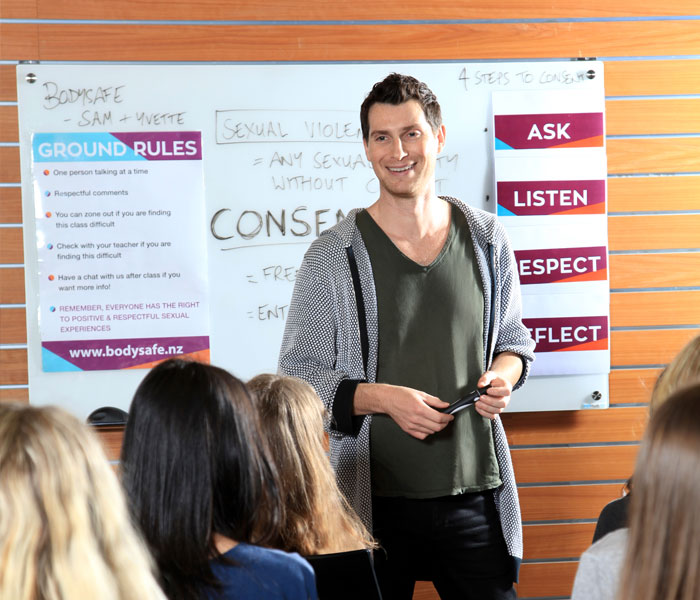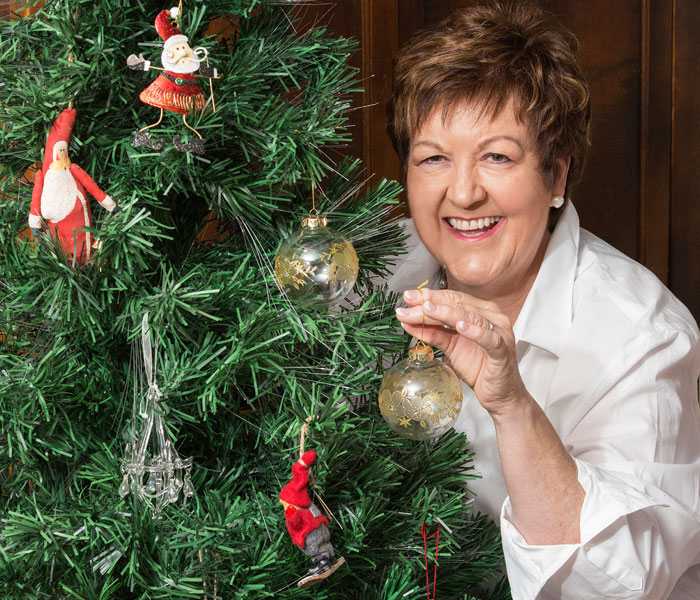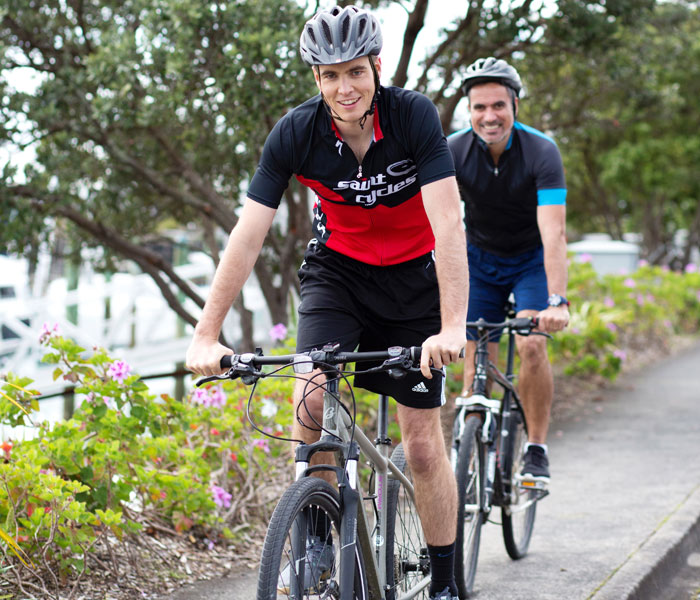Jaquie Brown
Comedian, actress and columnist Jaquie Brown supports animal advocacy organisation SAFE (Save Animals From Exploitation).
Raised vegetarian, Jaquie Brown gives high importance to animal rights and environmental awareness. She joined animal advocacy organisation SAFE a decade ago as a celebrity ambassador, to show her support for the humane treatment of animals in New Zealand.
“It is something I really believe in,” she says. “And as I’ve got older I’ve realised the implications of eating meat, both on the environment and on people’s health. I am not ready to live off the grid but I do think it is important to acknowledge where our food comes from, and if you are going to eat meat [which she now does to a limited extent], make sure it has been grown organically and had a good life.”
There will be a chicken on UK-born Jaquie’s Christmas table – but she says she will be choosing it carefully.
“I go to my butcher and order ahead and say, ‘I want to be good and make sure it had a happy life. Did it have a name? Did it have a family? What star sign was it? Has it been blessed?’” she says with her signature grin.
“I am not religious but I am earthy and spiritual in that sense, so just give thanks to the chicken for its life, appreciating it when you are carving it – say, ‘Thanks chick, good on you buddy.’”
Jaquie’s message during the festive season is to be conscious of your food source.
“The best thing people can do at this time of the year is to learn where the food you are putting on your table actually comes from. Try to find organic and free-range meat, or incorporate a few meat-free meals.”
The mother-of-two is now a semi-vegetarian who eats free-range, organic chicken and sustainable seafood. She says her prime concern is the mistreatment of animals being bred for food.
“Chicken and pig cruelty really upsets me,” she says. “Being in these cramped conditions, not being able to see the daylight, just being bred for our food. Those [intensively caged] chickens have broken wings, feathers missing and they are just sad; it really is heartbreaking.
“Christmas is quite a meaty time, and it will be hard for people who have eaten meat all their life to eat vegetarian, but you can encourage a few interesting salads and present a few vegetarian meals along with the meats. There are recipes that are super tasty and don’t have to be crammed full of meat. Haloumi is a really great option – I love that squeaky cheese! If you have the flavours in a vegetarian meal – herbs, zesty lemon, olive oil – it is so good for you and so delicious.”

Sam Bunkall
Shortland Street actor Sam Bunkall donates his time as an educator for Rape Prevention Education.
Much like his onscreen alter-ego Boyd Rolleston in Shortland Street, Sam Bunkall is determined to make a difference. His mission is to educate Kiwi teens on the dangers of sexual violence.
It was not a cause Sam knew much about, but his training to be educator for Rape Prevention Education New Zealand (RPE) and the realisation of the prevalence of sexual abuse in our country ignited a strong determination to give teens the tools to look after themselves and others.
“Too many people still think that rape and sexual violence is women walking home wearing sexy clothing, having too much to drink, going down a back alley and getting attacked. What people don’t realise is that sexual violence can take place among friends, or in your own home by a family member or partner,” he says.
The 34-year-old says he is shocked at how little discussion there is around sexual abuse. Now, when he is not on set, Sam walks into classrooms across Auckland and yells “Sex!” to break the ice and open up such conversations.
The BodySafe programme he teaches is made up of four modules, covering the definition of sexual violence and consent, respect in sexual relationships, childhood sexual abuse, what to do when a friend discloses sexual abuse to you, the effect of alcohol on sexual violence and how to deal with sexual violence in a party environment.
Sam says he is inspired by the confidence he sees growing within each of the students as they progress through the programme.
Since he started working for the not-for-profit organisation five years ago, he says a “scary” number of people in his own life have come forward and admitted to having experienced some form of sexual violence. The statistics among school-aged children are even more horrifying, he says, with approximately one in five females and one in 10 males likely to experience sexual violence before their 16th birthday, according to a 2012 survey.
While the BodySafe programme teaches students invaluable tools, RPE is barely scratching the surface in terms of addressing the need for rape prevention education, the actor says.
“There are only 20-30 schools in the Auckland area who take part in the BodySafe programme, I would say. And there are around 120 to 150 schools in the Auckland region.”
The programme is not mandatory and RPE is not allowed to approach schools to encourage them to take part. Sam also says a lack of funding has seen the organisation downsize its programme. He encourages people who believe in the cause to donate online through the website – rpe.co.nz.
“We aren’t here to tell people they should have sex or they shouldn’t – we understand everyone has their own views on those things. We are just here to give people information – we are giving them the tools to keep everyone involved safe, for when and if they do decide to have sex.
“We need to understand that when the Donald Trumps of the world are saying disrespectful things about women, we can’t just sweep it under the carpet. And that starts with teaching young people the right way to view and approach these situations,” Sam says fiercely.

Lizzie Marvelly
Singer, social activist and writer Lizzie Marvelly supports Variety, which provides care and support for New Zealand’s sick, disabled and disadvantaged children.
It’s Lizzie Marvelly’s own childhood that motivates her when she’s working with children. The 27-year-old singer, who recently celebrated a decade in the music business, had everything she needed as a child, but her school was a low-decile primary where many of her classmates were lacking.
“I was very lucky. I had lunch to take to school, a warm bed and my parents could afford for me to play sport and do piano lessons, but there were so many kids in my class who didn’t have any lunch, didn’t have any shoes and would wear the same tracksuit every day in winter.
“I think even then, as a young child, I was struck with this feeling of ‘this isn’t fair’ – and that has really driven me. I can remember kids at class who were left back from camp because their parents could not afford it, and they were left out of all those conversations and all the learning that was done on camp, and it just sucked.”
Lizzie attended state schools in Rotorua until at 16 she was awarded a scholarship at prestigious King’s College in Auckland.
“Going to King’s was quite defining for me. It really opened my eyes to how massive inequality is, even here in New Zealand. I wish all Kiwi kids could have the basics for a start and the opportunities to reach their full potential.”
Lizzie became an official ambassador for Variety in 2011, but she has been involved with the organisation since 2008, after performing a concert for them and loving what they did.
“I have always been passionate about kids and young people and I really liked their work and the broadness of their remit. They work with kids who are disadvantaged, sick and disabled.
“They do a bunch of different programmes, but the one I am most proud of is the Kiwi Kid Sponsorship programme. Sponsors provide funding monthly,” she explains. “The money goes directly to that child and is tailored to what they need – a pair of glasses, a school jumper, new stationery or money to go to school camp. This is important because kids have such different needs.”
Christmas, says Lizzie, is the perfect time to sponsor a child. “It is the gift that keeps giving. I am an absolute obsessive with Christmas – it is quite embarrassing – but I wish we had that spirit of giving all year round. That is what sponsorship allows. You can sponsor a kid this Christmas and help them for the whole year.
“Christmas is so tough because there is such a lot of pressure on gift giving. It breaks my heart that Santa won’t be coming to the houses of some Kiwi kids this Christmas, but it is also the time when parents are looking ahead to the new school year, and that means [the expense of] new stationery, new school fees. Having a sponsor allows families to know they will have that extra bit of support in the year ahead.”
A Kiwi Kid Sponsorship starts at $45 a month and Lizzie says it is common for the children to correspond with their sponsors.
“You can write messages to them and they will quite often write letters and tell you what they are up to. Some of them are quite little; I sponsor a five-year-old, so it’s more like drawings. It is gorgeous,” she says. “They are just Kiwi kids leading very normal lives, but lives that are pressured by deprivation.”
“It is great to know you can make some difference. I think for a lot of people, if they are going to give money they want to know where it is going, and with this programme you know exactly who it is benefiting, and you are able to see the results of your support. I have read a lot of letters from kids who have been sponsored and they say things like ‘You are my angel. Now I can go and play soccer with my friends. I could never afford the boots or the fees before.’”
Find out more at variety.org.nz

Jo Seagar
Celebrity cook and columnist for The Australian Women’s Weekly Jo Seagar is the patron for Hospice New Zealand.
Jo Seagar learned firsthand the value of Hospice when the organisation supported her father through his final weeks.
“Dad died at home about 18 years ago, in his own bed, pain-free and comfortable. He had a good birth, a good life and a bloody good death. Hospice allowed Mum to be his darling wife and his children to be his kids.”
At that time, Jo was being asked to lend her services to a number of different organisations. Hospice got her vote.
“I got quite famous then for waving my wire whisk and holding a conversation simultaneously on the telly,” she says. “I had thousands of fan-mail letters and loads of requests to help every charity, every fundraiser and every school trip.
“I spent a bit of time with the philanthropic trust in Wellington, going, ‘Where is the need greatest?’ and they said, ‘Hospice really needs a champion.’ So it was meant to be really. We entered into what has been a very happy marriage. I have been the ambassador for all those years and a couple of years ago I was made Patron.”
Hospice offers end-of-life care to New Zealanders and their families and specialist care to people living with incurable illnesses. It’s an essential healthcare provider with the majority of funding coming from government – but each year there is a major shortfall. In 2015, $45 million was required from fundraising efforts to meet that deficit and continue to provide the service free to New Zealanders.
“I am just one of thousands of Hospice volunteers who work around the country,” Jo explains. “Some make marmalade; others do patchwork quilts or work in a hospice doing the meals and laundry. My role is raising funds and awareness of the work of Hospice.
“The need is getting bigger and bigger,” she continues. “Last year one in three people who died was connected to and supported by Hospice. It’s not just about a place that you go to – they offer social, mental, physical and spiritual support in their homes or wherever they are, and it is about the whole family.”
Jo says in the lead-up to Christmas people can help Hospice by supporting The Tree of Remembrance campaign at Farmers stores around the country. Everyone who makes a donation to Hospice will receive a special card, on which they can write a personal message to a loved one. The card can be placed on the dedicated remembrance tree in the store or taken home. Farmers will also be selling hand-painted glass Christmas tree baubles, designed by New Zealand artist Flox, for $10 each.
All proceeds from both initiatives go to local Hospice services. Last year more than $675,000 was raised.
“It is a beautiful thing,” says Jo. “Hospice is totally free and we want it to stay that way, so it needs a big amount of fundraising.
“At Christmas people often say things like ‘Hospice helped my mum manage her pain so she could have Christmas Day with the family.’ They have a lot of specialist treatment and care – but, really, the whole philosophy is about living every moment you have got.
“Hospice allowed my family to spend quality time with Dad and he was very comfortable that we weren’t doing the bed pans and changing the bed and handling the medicine while having his last few days with us. That is a fantastic part of the organisation.”
Find out more at hospice.org.nz

Jack Tame
Co-host of TVNZ’s Breakfast and a Newstalk ZB radio host, Jack Tame supports Men’s Health Trust.
Broadcaster Jack Tame regularly cycles Auckland’s inner-city streets. Back from five years in New York as TVNZ’s US correspondent, he is grateful for the quieter roads and for some structure in his life.
“Although I loved my time in the US, the trouble was at a moment’s notice you were off to Ohio, to South Carolina – you were never sure where you were going to be sleeping that night, so it is nice to have a bit more routine,” says the 29-year-old.
Incorporating exercise into his day helps his health physically and mentally, he says.
“Cycling was one of the things I wasn’t game enough to do in New York – I always worried about being munched under a bus. Here it is so easy.”
Jack has become an ambassador for Men’s Health Trust and is keen to help Kiwi men find balance.
“It seems crazy that we are an educated, worldly people but New Zealand men are still pretty lousy at looking after their health. It’s such a ‘she’ll be right’ attitude. Many of the big killers are preventable or at least identifiable at an early stage. It’s so silly that men wouldn’t have prostate checks from an early age and are so cavalier about fitness and nutrition.”
Jack’s messages on behalf of Men’s Health are simple – go to the doctor for regular check-ups, incorporate exercise into your routine, and eat and sleep well.
“There’s that attitude that it’s a chore, but actually it gives you more enjoyment. No one is suggesting you eat kale smoothies for every meal or run a marathon – it can just be a walk. Exercise is a free rush – I don’t know why you wouldn’t want it.”
His intense schedule in the US meant Jack had to look after his health to perform well.
“It is a city of temptation. You can go out any night of the week and get up to mischief but I soon worked out that if I wanted to do a good job I had to find balance. I would do simple, practical things – if I was booking flights, I’d book it so I could go to the gym beforehand or get a run in once I hit the ground.”
Covering traumatic events such as mass shootings put pressure on Jack’s mental health and he had to find a way to release the stress without turning to alcohol.
“It is tempting in those situations to go a bit nuts and drown your sorrows, but the best thing was to exercise, have a good dinner, eat some greens and get some sleep.”
His role model for health is close to home.
“My dad is really good. He put on a couple of kilograms a few years ago, and so he set himself a challenge to be a bit more active. Every day now he power-walks four kilometres to work and back. The benefits are not only better sleep but also he gets time to think in the mornings or listen to the radio on the way to work.”
Jack’s advice for the Christmas season is to get outdoors.
“The Kiwi summer is perfect for getting outside, going to the beach and getting a bit of exercise. People focus on New Year as a time to reset our lifestyles but now is the best time to get into those habits. You will enjoy wine on Christmas Day that much more for having gone for a jog twice that week or to the gym, or having had a good sleep the night before. You will enjoy life’s pleasures more for having a bit of balance.”
Find out more at menshealthnz.org.nz
WATCH: Jack Tame’s top three health tips
.jpg)



